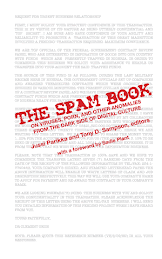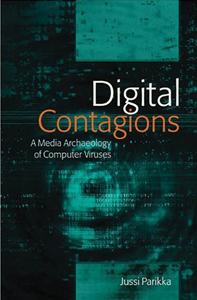Slightly perhaps shadowed by the Nobel prize announcements, the nominees for the Transmediale 2011 theory award - the Vilem Flusser award - were revealed this week.
I happy and excited being one of them, for the piece we wrote together with Garnet Hertz: "Zombie Media: Circuit Bending Media Archaeology into an Art Method". The text is a theoretical excavation into thinking such art methods as circuit bending as media archaeological, and hence, expanding the notion of media archaeology from a textual method into something more strongly connected to the political economy of clipped shut information technology and material digital culture art practices: tinkering with technology that is not meant to be opened, changed, modified. Hence we mobilize such key themes as "black boxes" which have of course been well thematized in Science and Technology Studies (STS), but now in a media archaeological and hacktivist setting. Hence, the name zombie media: not dead media, even if old, passed away even; we write in the conclusions: "media never dies. Media may disappear in a popular sense, but it never dies: it decays, rots, reforms, remixes, and gets historicized, reinterpreted and collected. It either stays as a residue in the soil and in the air as concrete dead media, or is reappropriated through artistic, tinkering methodologies."
Here the info from the Transmediale 2011-website:
Vilém Flusser Theory Award
Congratulations to the following four nominees of Vilém Flusser Theory Award 2011!
The Vilém Flusser Theory Award (VFTA) promotes innovative media theory and practice-oriented research exploring current and pending positions in digital art, media culture and networked society. The call was open to publications, positions, and projects from a broad range of theoretical, artistic, critical or design-based research that seeks to establish and define new forms of exchange, vocabularies and cultural dialogue.
Zombie Media: Circuit Bending Media Archaeology into an Art Method
Garnet Hertz & Jussi Parikka
GATHERINGS 1: EVENT, AGENCY, AND PROGRAM
Jordan Crandall
_Social Tesseracting_: Parts 1 - 3
Mez Breeze
Digital Anthropophagy and the Anthropophagic Re-Manifesto for the Digital Age
Vanessa Ramos-Velasquez
Friday, 8 October 2010
Sunday, 3 October 2010
Anna Munster talk at the CoDE-institute

The next CoDE-talk:
Dr Anna Munster on biopolitics, death and digital aesthetics
at Anglia Ruskin, East Road, Cambridge
Organized by Cultures of the Digital Economy institute, in collaboration with the New Network Politics-project
October 14, Thursday, 16.00-17.30
Room: Helmore 112
'Out of the biopolitical frypan and into the noopolitical fire: death and finitude as emerging trends in digital culture and aesthetics'
Abstract:
This paper tracks the emergence of a digital ethos that is cognisant of consequence, finitude and even death. On the one hand, sectors of the digital entertainment industry – specifically computer games developers – and new start-up industries are concerned with the question of how to m...anage ‘death’ digitally. On the other hand, death and suicide have become the impetus for creative expression. Bernard Stiegler’s analysis of technicity goes some way toward unfolding a political analysis of the relations between ‘life’ and ‘death’ in the recent and current aesthetics of digital code. Specifically, his more recent work is concerned with the over-reaching of biopower into what he terms ‘psychopower’ and with inventing a 'noopolitics' that can respond to this.
But I will also argue that his articulation of noopolitics fails to provide us with a way to conduct ourselves digitally in the light of the spread of technologies and cultures of cognitive capitalism. It does not take account of either the recuperative noopolitics of aesthetic practices in an economy of cognitive capitalism or the productive and differentiating potential of aesthetic practices of digital ‘coding’ that suggest lines of flight for contemporary technoculture. I focus upon the relation between recuperated and critical software practices and the constitution of provisional networked publics that transversally produce lines of flight toward a more transformative noopolitics for digital aesthetics.
Bio:
Anna Munster is a writer, artist and educator. She is the author of Materializing New Media (Dartmouth College Press, 2006) and one of the founders of the online open-access journal The Fibreculture Journal. Her theoretical and artistic research covers the politics and aesthetics of networks and media technologies, biopolitics and information societies, embodied perception and neuroscience. She is currently working on a database for generating dynamic concepts about contemporary media (http://www.dynamicmedianetwork.org/), and a book on how networks experience. She is an associate professor, College of Fine Arts, University of New South Wales, Sydney Australia.
Subscribe to:
Posts (Atom)







